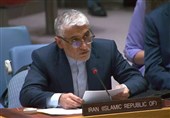Iran to Protect Rights of Victims of Saddam's Chemical Weapons: Zarif
TEHRAN (Tasnim) – Iranian Foreign Minister Mohammad Javad Zarif announced that the country is making serious efforts at international level to restore the rights of the Iranian victims of chemical weapons used by former Iraqi dictator Saddam Hussein in the war against Iran in 1980s.
In a message issued on the 28th anniversary of 1987 chemical bombardment of Iran’s northwestern city of Sardasht, which killed over 100 Iranian civilians and injured hundreds of others, Zarif reminded the international community of their “legal and moral responsibility” to the victims and their families.
The foreign minister called on the international bodies to prosecute those responsible for supplying Saddam Hussein with the chemical weapons.
The Islamic Republic of Iran, as an active member of the Organization for the Prohibition of Chemical Weapons, will continue its joint efforts with other member states until the total annihilation of all chemical weapons across the world, he noted.
Known as a major victim of WMDs and chemical weapons in the world, Iran has on multiple occasions voiced its steadfast opposition to such weapons.
During the eight-year Iraqi imposed war on the Islamic Republic in the 1980s, more than 1,000,000 Iranians were exposed to chemical agents of different types used by the Iraqi forces.
Between 10,000 and 20,000 people were killed and 100,000 of those who survived have developed acute symptoms, often chronic.
From 1983, Saddam Hussein's regime repeatedly attacked Iran with mustard gas, sarin and tabun to reverse the fortunes of its failed invasion of Iran three years earlier.
Firms from Western countries -including Germany, France, Italy, Spain, the US and Austria- and some other countries provided the slain Iraqi dictator with chemical precursors, equipment and know-how to produce chemical weapons which he used against the Iranian armed forces and civilians during the war (1980-1988).
Saddam also used such deadly weapons in 1988 in the Al-Anfal Campaign against his civilian Kurdish population and during a popular uprising in the south in 1991.






